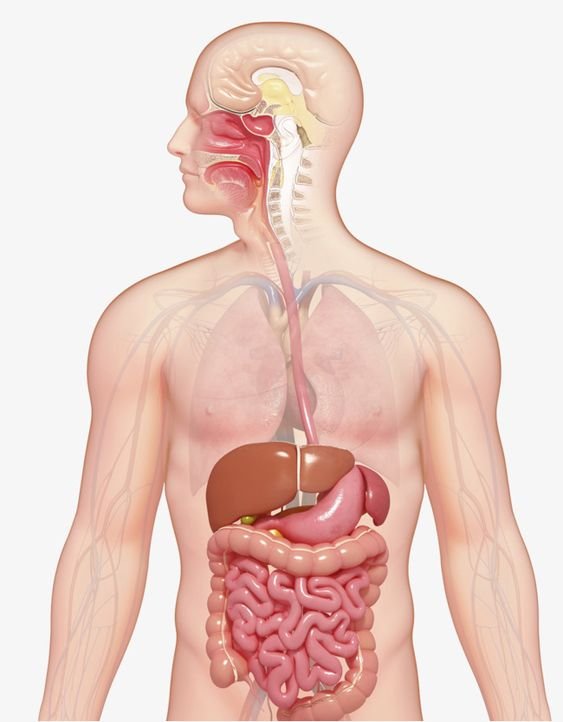Our digestive system is a fascinating and intricate part of our body that often goes unnoticed until something goes wrong. Yet, it plays a crucial role in our overall health and well-being. In this blog, we’ll journey through the digestive system, exploring each stage and its significance in transforming the food we eat into the nutrients our body needs.

The Journey Begins: The Mouth
The digestive process starts the moment food enters your mouth. Chewing breaks down food into smaller pieces, making it easier to digest. Saliva, produced by salivary glands, contains enzymes like amylase that begin breaking down carbohydrates. This mixture of food and saliva is called a bolus.
Down the Hatch: The Esophagus
Once you swallow, the bolus travels down the esophagus, a muscular tube connecting the throat to the stomach. The esophagus uses rhythmic contractions known as peristalsis to move food toward the stomach. A valve called the lower esophageal sphincter relaxes to allow the bolus to enter the stomach and then closes to prevent stomach acids from coming back up.
The Mixing Bowl: The Stomach
The stomach is a muscular, hollow organ that serves as a temporary holding area for food. Gastric juices, which include hydrochloric acid and digestive enzymes, break down food into a semi-liquid mixture called chyme. The stomach’s strong muscular walls churn the food, enhancing digestion. This process can take several hours, depending on the type of food consumed.
The Absorption Hub: The Small Intestine
Next, the chyme moves into the small intestine, which is about 20 feet long and consists of three parts: the duodenum, jejunum, and ileum. The small intestine is where most nutrient absorption occurs. Digestive enzymes from the pancreas and bile from the liver aid in breaking down proteins, fats, and carbohydrates. The walls of the small intestine are lined with tiny hair-like structures called villi and microvilli, which increase the surface area for nutrient absorption.
The Cleanup Crew: The Large Intestine
After passing through the small intestine, any remaining waste enters the large intestine or colon. The large intestine absorbs water and electrolytes from the waste material, transforming it into a more solid form. Beneficial bacteria in the colon further break down any remaining nutrients and produce essential vitamins like vitamin K and some B vitamins. The leftover waste is then stored in the rectum until it is ready to be expelled from the body through the anus during defecation.
The Liver and Pancreas: The Unsung Heroes
Two vital organs that support the digestive system are the liver and pancreas. The liver produces bile, which helps digest fats and is stored in the gallbladder. The pancreas produces digestive enzymes that break down carbohydrates, proteins, and fats. Additionally, the pancreas secretes insulin, a hormone that regulates blood sugar levels.
Common Digestive Issues
The digestive system can sometimes encounter problems, leading to discomfort and health issues. Common digestive problems include acid reflux, irritable bowel syndrome (IBS), and food intolerances. Maintaining a healthy diet, staying hydrated, and managing stress can help keep your digestive system functioning smoothly.
Conclusion: The Digestive System’s Vital Role
Our digestive system is a remarkable and complex network that works tirelessly to ensure our bodies get the necessary nutrients. Understanding how it functions can help us make better choices for our health and appreciate the intricate processes happening inside us every day. So, the next time you enjoy a meal, take a moment to thank your digestive system for its hard work!

Tips for a Healthy Digestive System
- Eat a Balanced Diet: Include plenty of fruits, vegetables, whole grains, and lean proteins in your diet.
- Stay Hydrated: Drink plenty of water to help your digestive system process food efficiently.
- Exercise Regularly: Physical activity can help keep your digestive system moving smoothly.
- Manage Stress: High stress levels can negatively impact your digestive health—practice relaxation techniques like meditation or yoga.
- Avoid Overeating: Eating smaller, more frequent meals can be easier on your digestive system.
By understanding and taking care of our digestive system, we can ensure it continues to support our health and well-being for years to come.

